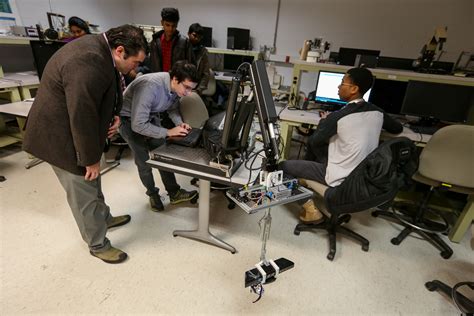In today’s rapidly advancing technological landscape, robotics and automation have become essential components of various industries. As the demand for engineers specializing in robotics and automation continues to grow, it is crucial for aspiring students to find the right programs and resources to excel in this field. This blog post will explore the significance of robotics and automation programs, the increasing demand for robotics engineers, and the top universities offering specialized programs in this area. We will also delve into the curriculum, state-of-the-art facilities, internship opportunities, success stories of graduates, and future job prospects in the field. Whether you are a current student looking to pursue a career in robotics or a professional considering a switch to this dynamic field, this blog post aims to provide valuable insights to help you navigate through the engineering landscape and pave a successful path towards the future.
Table of Contents
Why Robotics and Automation Programs are Essential
In today’s rapidly evolving world, robotics and automation have become essential in nearly every industry. As technology continues to advance, the need for skilled professionals who can design, build, and maintain robotic systems and automated processes has never been greater.
With the increasing demand for innovative solutions to improve efficiency, effectiveness, and safety, robotics and automation programs are an integral part of higher education. These programs provide students with the knowledge and skills needed to succeed in the modern workforce.
Furthermore, the integration of robotics and automation in various fields such as manufacturing, healthcare, agriculture, and transportation, highlights the significance of these programs. By understanding the principles and applications of robotic technology, graduates can contribute to the development of cutting-edge solutions to address real-world challenges.
Overall, robotics and automation programs are essential for shaping the future of technology and industry, and preparing the next generation of professionals to drive innovation and progress.
The Growing Demand for Robotics Engineers
In today’s rapidly advancing technological landscape, the demand for robotics engineers is on the rise. As industries across the globe continue to embrace automation and the use of robotics, the need for skilled professionals in this field has never been greater. Whether it’s manufacturing, healthcare, logistics, or even entertainment, the applications of robotics are vast, and so is the need for individuals who can design, build, and maintain these sophisticated systems.
As more and more companies invest in automation to improve efficiency and productivity, the job market for robotics engineers is becoming increasingly competitive. This is especially true for those with specialized skills in areas such as artificial intelligence, machine learning, and autonomous systems. As a result, robotics engineers are not only in high demand, but they also have the opportunity to work on cutting-edge projects that are shaping the future of technology.
Furthermore, the growth in demand for robotics engineers is not limited to traditional industries. With the rise of fields such as drone technology, robotics in agriculture, and the development of humanoid robots, the opportunities for skilled professionals in this field are expanding rapidly. This means that robotics engineers have the chance to make a significant impact across a wide range of sectors, from healthcare and agriculture to entertainment and beyond.
Overall, the growing demand for robotics engineers reflects the increasing role of automation and technology in the modern world. As industries continue to evolve and adapt to the digital age, the need for individuals who can innovate and drive progress in robotics will only continue to grow.
Top Universities Offering Robotics and Automation Programs
When it comes to pursuing a career in robotics and automation, choosing the right university and program is crucial. The field of robotics and automation is rapidly evolving, and it is important for students to receive education and training from top-tier institutions.
Several universities around the world offer comprehensive programs in robotics and automation. The Massachusetts Institute of Technology (MIT) is recognized for its cutting-edge research and innovative curriculum in robotics. Students at MIT have access to state-of-the-art facilities and opportunities for hands-on experience. Another top institution for robotics education is Stanford University, which offers a diverse range of courses and encourages students to engage in research and development.
In addition to MIT and Stanford, Carnegie Mellon University is renowned for its robotics and automation programs. With a strong emphasis on interdisciplinary education and collaboration, students at Carnegie Mellon benefit from a well-rounded education in robotics. Other top universities offering robotics and automation programs include University of California, Berkeley, and University of Tokyo. These institutions provide students with the knowledge and skills needed to succeed in the ever-expanding field of robotics and automation.
Choosing a university with a strong robotics and automation program can greatly impact a student’s career prospects and opportunities for growth. By enrolling in a top university, students can gain valuable expertise and experience that will prepare them for success in the field of robotics and automation.
Curriculum and Courses in Robotics and Automation
When it comes to pursuing a career in robotics and automation, understanding the specific curriculum and courses offered by universities and colleges is essential. The field of robotics and automation encompasses a wide range of disciplines, including mechanical engineering, electrical engineering, computer science, and artificial intelligence. As such, the curriculum for robotics and automation programs is typically interdisciplinary, providing students with a well-rounded education in all of these areas.
Students can expect to take foundational courses in mathematics, physics, and computer science, as well as specialized courses in robotics, control systems, and artificial intelligence. These courses are designed to provide students with the theoretical knowledge and practical skills needed to design, build, and program robotic systems for a variety of applications, including manufacturing, healthcare, and aerospace.
In addition to core courses, many robotics and automation programs offer elective courses that allow students to specialize in specific areas of interest, such as autonomous systems, human-robot interaction, or machine learning. This flexibility in coursework enables students to tailor their education to their career goals and interests, ensuring that they are well-prepared for the diverse and rapidly evolving field of robotics and automation.
Overall, the curriculum and courses in robotics and automation programs are carefully designed to provide students with a comprehensive education that prepares them for the challenges and opportunities in this exciting field.
State-of-the-Art Facilities for Robotics Research
Robotics and automation are rapidly growing fields, and it is essential for students to have access to state-of-the-art facilities for their research and projects. Universities that offer robotics and automation programs understand the importance of providing students with the latest technology and resources to further their education and prepare them for the workforce.
These facilities often include advanced laboratories equipped with the latest robotic arms, sensors, and other equipment. Students can use these labs to design, build, and test their own robots, gaining hands-on experience with cutting-edge technology.
In addition to laboratories, universities with strong robotics programs often have dedicated spaces for research and development, including workshops and collaborative spaces where students can work on projects and connect with their peers and mentors. These spaces allow students to explore their creativity and push the boundaries of what is possible in the field of robotics.
Furthermore, universities with state-of-the-art facilities for robotics research often have partnerships with industry leaders, providing students with access to real-world projects and internships. This allows students to apply their knowledge in practical settings and gain valuable experience that will benefit them as they enter the workforce after graduation.
Internship and Co-op Opportunities for Robotics Students
Robotics and automation programs are essential educational pathways for aspiring engineers, and one of the key components of these programs is the opportunity for internships and co-op experiences. These real-world opportunities provide students with the chance to apply their knowledge in a professional setting, gain valuable hands-on experience, and make meaningful connections in the industry.
Internships and co-op experiences allow robotics students to work alongside experienced professionals, contributing to real projects and gaining insight into the day-to-day operations of a robotics-focused workplace. This practical exposure is invaluable for students looking to launch their careers in the field, as it not only enhances their technical skills but also helps them develop essential professional competencies such as teamwork, communication, and problem-solving.
Many top universities offering robotics and automation programs have established partnerships with industry-leading companies and research institutions to facilitate these internship and co-op opportunities for their students. This network provides students with access to a wide range of potential placements, from startups to multinational corporations, enabling them to explore different facets of the robotics industry and discover where their interests and talents align.
Furthermore, the connections made during internships and co-op experiences often lead to future employment opportunities. Many students are offered full-time positions at the organizations where they intern, making these experiences not only a learning opportunity but also a potential launchpad for a successful career in robotics and automation.
Success Stories of Robotics Graduates
One success story of a robotics graduate is the story of John, who graduated with a degree in robotics and automation from a top university. After completing his degree, John landed a job at a leading tech company, where he played a key role in developing an innovative robotic system for manufacturing processes. His work was recognized and appreciated by the company, and John quickly rose through the ranks to become a senior robotics engineer.
Another inspiring success story is that of Lisa, who pursued her passion for robotics and automation throughout her academic career. She participated in robotics competitions and was actively involved in robotics clubs at her university. After graduation, Lisa secured a prestigious internship at a renowned research institute, where she contributed to cutting-edge robotic projects. Her dedication and hard work paid off, and she was offered a full-time position at the institute upon completing her internship.
Furthermore, there is the story of David, who received a scholarship to pursue his studies in robotics and automation. With the financial assistance, he was able to focus on his education and gain valuable skills in robotic programming and design. Upon graduating, David secured a position at a startup company, where he was involved in developing autonomous robotic systems for various industries. His success in the field and innovative contributions led to the rapid growth and success of the startup.
These success stories of robotics graduates highlight the diverse career opportunities and accomplishments that await those who pursue a degree in robotics and automation. With the growing demand for robotics engineers and the continuous advancements in robotic technologies, the future looks promising for aspiring robotics professionals.
Robotics Competitions and Clubs at Universities
Robotics competitions and clubs at universities play a vital role in providing students with opportunities to put their skills to the test and gain practical experience in the field of robotics. These competitions and clubs are not only a great way for students to apply their knowledge and creativity, but they also provide a platform for networking and collaboration with like-minded individuals.
Participating in robotics competitions allows students to gain hands-on experience in designing, building, and programming robots to compete in various challenges. These competitions often require a high level of teamwork, problem-solving, and critical thinking, which are essential skills for a successful career in robotics.
Furthermore, robotics clubs at universities offer a supportive community for students who are passionate about robotics. These clubs provide a platform for students to share their ideas, collaborate on projects, and engage in discussions about the latest developments in robotics technology.
Overall, robotics competitions and clubs at universities are a valuable component of a student’s educational journey in robotics, providing them with real-world experience, networking opportunities, and a supportive community to help them thrive in the field.
Scholarships and Financial Aid for Robotics Students
As the demand for robotics engineers continues to grow, it is essential to provide financial support for students pursuing a degree in robotics and automation. Fortunately, there are numerous scholarships and financial aid options available for students interested in this field.
Many universities offer specific scholarships for students majoring in robotics and automation programs. These scholarships are often funded by industry partners who are eager to support the next generation of talent in this rapidly expanding field. Additionally, there are also general engineering scholarships that robotics students can apply for, as the skills and knowledge gained in this field often overlap with other engineering disciplines.
In addition to scholarships, there are also various forms of financial aid available for robotics students, such as grants, work-study programs, and student loans. It is important for students to explore all of their options and apply for any financial assistance that they may be eligible for. With the rising cost of education, these forms of financial aid can make a significant difference in a student’s ability to pursue their passion for robotics.
Overall, the availability of scholarships and financial aid for robotics students demonstrates the commitment of educational institutions and industry partners to supporting the next generation of robotics engineers. By providing these opportunities, more students are able to access quality education and training in robotics and automation, ultimately contributing to the continued growth and innovation in this field.
Future Job Prospects for Robotics and Automation Graduates
In today’s rapidly advancing technological landscape, the future looks bright for robotics and automation graduates. With the increasing integration of robotics in various industries, there is a growing demand for professionals with expertise in this field. Companies across sectors such as manufacturing, healthcare, logistics, and agriculture are seeking individuals who can design, develop, and maintain robots and automated systems.
One of the key reasons why the job prospects for robotics and automation graduates are promising is the potential for automation to streamline operations and reduce costs for businesses. As automation becomes more prevalent, there is a need for skilled professionals who can oversee the implementation and maintenance of these systems, ensuring efficiency and reliability.
Additionally, the rise of artificial intelligence and machine learning has opened up new opportunities for robotics and automation graduates. These technologies are driving the development of advanced robotic systems capable of performing complex tasks, further increasing the demand for skilled professionals in this field.
Furthermore, as robotics and automation continue to evolve, there is potential for graduates to pursue entrepreneurial ventures or research opportunities. The field is ripe for innovation, and individuals with a strong foundation in robotics and automation are well-positioned to drive technological advancement and shape the future of industry.






